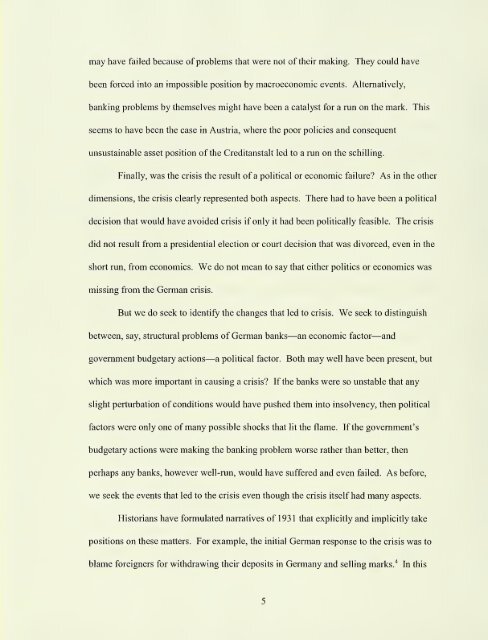Made in Germany : the German currency crisis of July 1931
Made in Germany : the German currency crisis of July 1931
Made in Germany : the German currency crisis of July 1931
Create successful ePaper yourself
Turn your PDF publications into a flip-book with our unique Google optimized e-Paper software.
may have failed because <strong>of</strong> problems that were not <strong>of</strong> <strong>the</strong>ir mak<strong>in</strong>g. They could have<br />
been forced <strong>in</strong>to an impossible position by macroeconomic events. Alternatively,<br />
bank<strong>in</strong>g problems by <strong>the</strong>mselves might have been a catalyst for a run on <strong>the</strong> mark. This<br />
seems to have been <strong>the</strong> case <strong>in</strong> Austria, where <strong>the</strong> poor policies and consequent<br />
unsusta<strong>in</strong>able asset position <strong>of</strong> <strong>the</strong> Creditanstalt led to a run on <strong>the</strong> schill<strong>in</strong>g.<br />
F<strong>in</strong>ally, was <strong>the</strong> <strong>crisis</strong> <strong>the</strong> result <strong>of</strong> a political or economic failure? As <strong>in</strong> <strong>the</strong> o<strong>the</strong>r<br />
dimensions, <strong>the</strong> <strong>crisis</strong> clearly represented both aspects. There had to have been a political<br />
decision that would have avoided <strong>crisis</strong> if only it had been politically feasible. The <strong>crisis</strong><br />
did not result from a presidential election or court decision that was divorced, even <strong>in</strong> <strong>the</strong><br />
short run, from economics. We do not mean to say that ei<strong>the</strong>r politics or economics was<br />
miss<strong>in</strong>g from <strong>the</strong> <strong>German</strong> <strong>crisis</strong>.<br />
But we do seek to identify <strong>the</strong> changes that led to <strong>crisis</strong>. We seek to dist<strong>in</strong>guish<br />
between, say, structural problems <strong>of</strong> <strong>German</strong> banks—an economic factor—and<br />
government budgetary actions—a political factor. Both may well have been present, but<br />
which was more important <strong>in</strong> caus<strong>in</strong>g a <strong>crisis</strong>? If <strong>the</strong> banks were so unstable that any<br />
slight perturbation <strong>of</strong> conditions would have pushed <strong>the</strong>m <strong>in</strong>to <strong>in</strong>solvency, <strong>the</strong>n political<br />
factors were only one <strong>of</strong> many possible shocks that lit <strong>the</strong> flame. If <strong>the</strong> government's<br />
budgetary actions were mak<strong>in</strong>g <strong>the</strong> bank<strong>in</strong>g problem worse ra<strong>the</strong>r than better, <strong>the</strong>n<br />
perhaps any banks, however well-run, would have suffered and even failed. As before,<br />
we seek <strong>the</strong> events that led to <strong>the</strong> <strong>crisis</strong> even though <strong>the</strong> <strong>crisis</strong> itself had many aspects.<br />
Historians have formulated narratives <strong>of</strong> <strong>1931</strong> that explicitly and implicitly take<br />
positions on <strong>the</strong>se matters. For example, <strong>the</strong> <strong>in</strong>itial <strong>German</strong> response to <strong>the</strong> <strong>crisis</strong> was to<br />
blame foreigners for withdraw<strong>in</strong>g <strong>the</strong>ir deposits <strong>in</strong> <strong><strong>German</strong>y</strong> and sell<strong>in</strong>g marks. 4 In this



